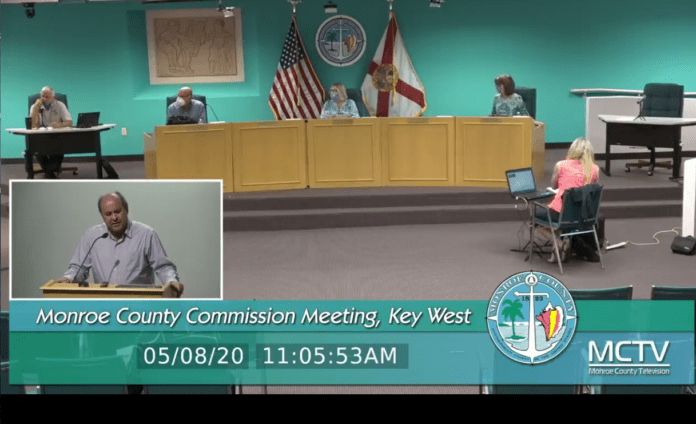The Monroe County Board of County Commissioners met May 8 to transfer money from various parts of the general fund to an account that will be used to pay county workers about $1.5 million that was accrued through special emergency response pay related to COVID-19.
The commission also delayed the deadline for employees to accept or waive the overtime pay and approved a formal resolution as a mechanism for them to do so.
The county’s Human Resources department sent out an email on May 4 warning county employees their decision was due by Monday, May 11. Commissioners balked at the short, over-the-weekend notice.
“I think they need a little bit more time,” said Mayor Heather Carruthers. The commission agreed and extended the deadline by one week, until Monday, May 18.
Monroe County Attorney Bob Shillinger told the commission the resolution allows salaried employees to waive the entire amount of emergency response pay. Hourly employees who worked more than 40 hours will be required to take the overtime because of federal law, but may decline the extra emergency response pay that’s on top of the hourly overtime.
Previously, Monroe County Emergency Management Director Shannon Weiner told Keys Weekly she wouldn’t accept the $26,457 she logged in emergency response pay between March 17 to April 11. She is a salaried employee. Some 400 county employees logged overtime; another 61 employees were furloughed.
Monroe County Commissioner Michelle Coldiron asked the county attorney if employees who accepted the overtime would be listed in the public record.
“Some employees might be shamed into doing something they don’t want to do,” she said. “I have extreme concern for our employees.”
Shillinger replied in the affirmative. “It will be public information, yes.”
“So if they want to accept the money, and then donate it to their favorite charity, their name will still appear in the newspaper?” Coldiron asked. “And then it will be up to them to make their own announcement about the donation?”
“They are going to make the right decision, whatever that is for them, and if there is criticism, there’s criticism,” Commissioner David Rice said. “I don’t know any other way to do it.”
If a county employee doesn’t reply to the email to waive the extra pay, they will automatically be paid for the emergency response time.
The county has said it expects FEMA to reimburse all but about $200,000 of the overtime pay at some point in the future. But the county needs money now to pay for things like a new accounting system.
At the start of the meeting, Clerk of the Court Kevin Madok told the council he wanted to use $1.5 million as a downpayment on a new accounting system that will cost close to $6 million when it’s in place, including subscription fees. He told the council he planned to use $1.5 million in excess fees to implement the start of the Enterprise Resources Planning system. The system ties together the clerk’s office as well as the county’s finance and human resources departments.
“Congratulations on your timing,” Rice deadpanned.
“I’m troubled by this,” said County Administrator Roman Gastesi. “Excess fees sounds like free money, but it’s budgeted money. We need to find $1.5 million in the next three months.”
The commission seemed to be caught flat-footed by this request, at a time when budget shortfalls are expected. Madok provided a timeline of his work on the new system dating back to 2018, and meetings with county officials as early as 2019. The system is expected to take 15 to 18 months to implement and the work was to have begun on May 4. Madok also said the outdated system currently in use will be discontinued soon, leaving few options.
The commission tabled the discussion until May 20 until they have a better understanding of the budget request.
Before the commission went into a closed meeting to discuss six legal cases, Gastesi brightened the mood with this:
“We did get a little good news,” said Gastesi. “The state deferred a $4.5 million payment to the state revolving loan fund for one year.”

























